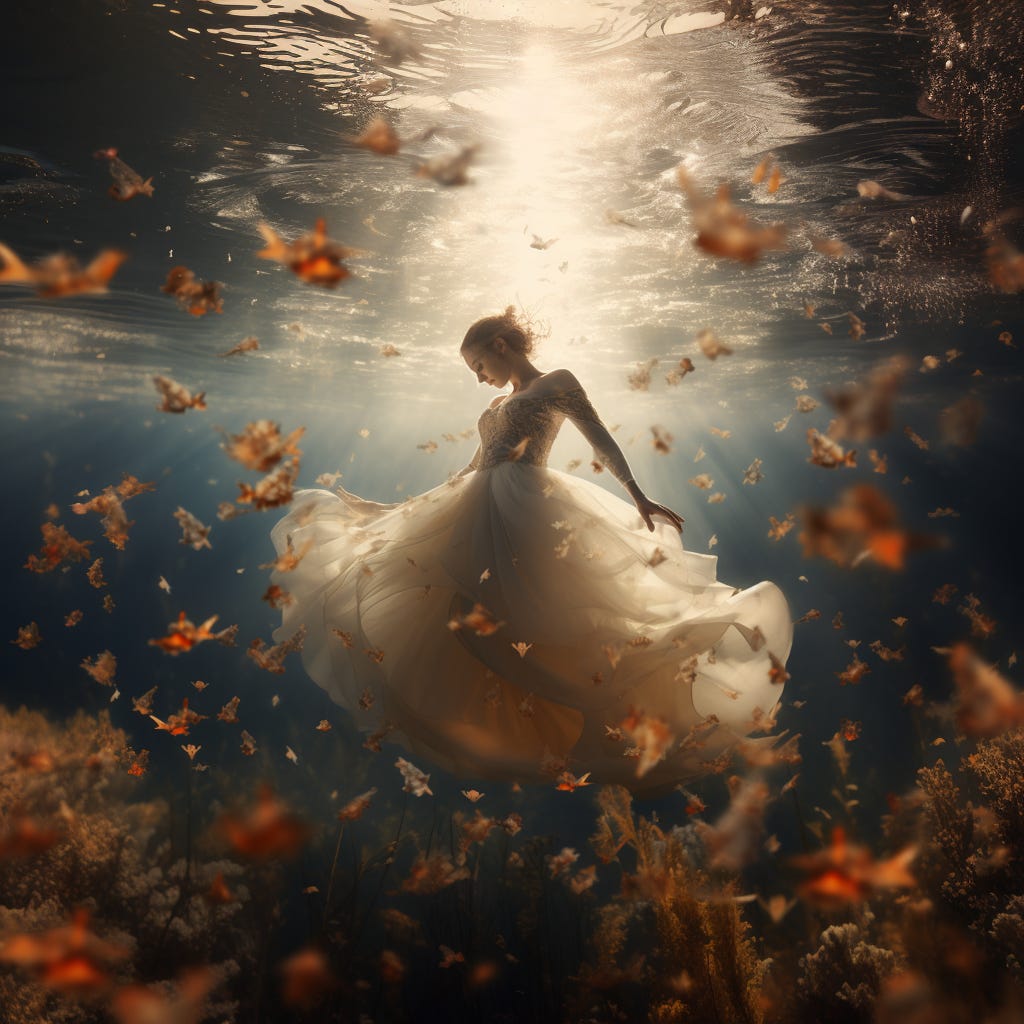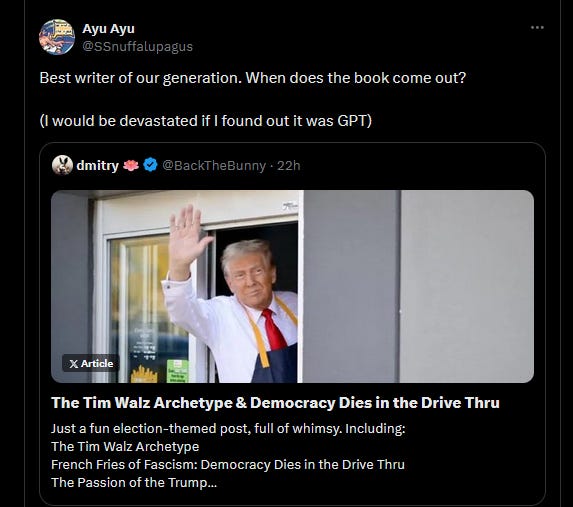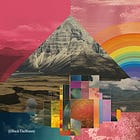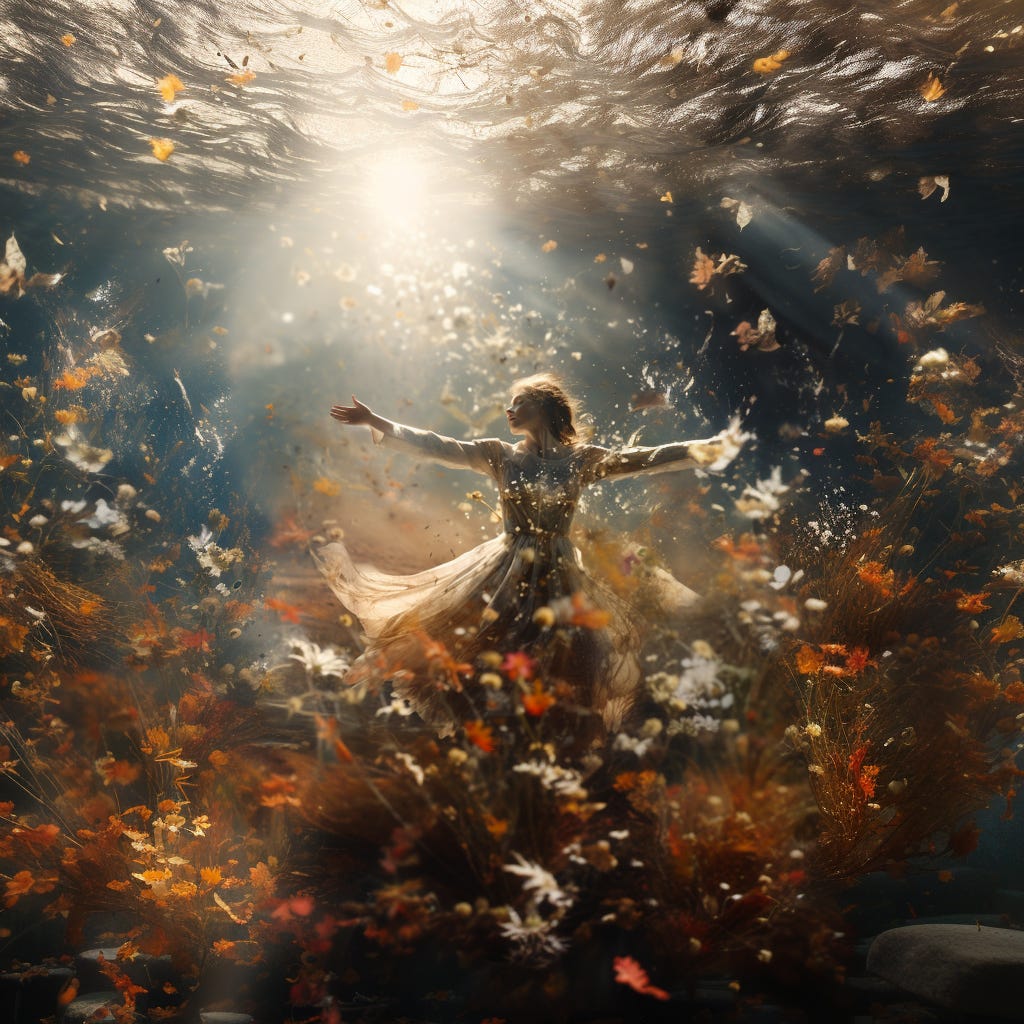“AI will be better than humans in creative, artistic, and competitive domains, and it's going to replace us."
I believe this is the wrong framing. This sentiment echoes through Silicon Valley boardrooms and Twitter threads with the confidence of prophecy. Yet it fundamentally misunderstands what makes us tick as creatures who create and consume culture. It’s a claim predicated on a category error of what art and competition are intended for: human consumption and fulfillment.
Artists should not fear AI: they should view it as a tool that can enhance them, not an entity that supplants them. We consume what we value. “Value” is not a mechanical, objective concept; it’s contextual, capricious, interpretive, and imperfect. Humans are the arbiters of value, not machines.
We don't always value what's objectively best or mechanically pristine. We innately seek out unique individual expression and associate it with its creator. When there is no human to accompany that creation, it rings hollow.
We have many an "irrational" need and attraction to a human presence when experiencing an authentic, emotional message. What we consider "real" and "fake" is psychologically critical and cannot be rationalized away.
Examples:
If someone's lip-syncing at a concert... do you like that? Or do you feel a little betrayed? By all audio accounts, it’s better than the artist's live voice. In fact singers often sound much worse live than they do in the studio. Lip-syncing gives you that crisp studio sound in the arena, yet we viscerally reject it. We want the cracked notes, the sweat-soaked authenticity of a human pushing their vocal cords to the limit.
We're paying for the possibility of imperfection: the very thing AI promises to eliminate
Do people favor the Harry Potter originals or Harry Potter fan fiction? I'm sure some of it's better than JK Rowling's work. I bet Claude could easily whip up some stories that rival it. Why is hers famous and revered, and not the derivatives?
What connotation does the word “original” have that carries such valence to us…? Why do we consider the first version the better one? Irrational much?
Consider the phenomenon of ghost kitchens: restaurants that exist only for delivery apps, with no physical location or human presence. The food might be identical to what you'd get at a 'real' restaurant, optimized by algorithms for maximum flavor delivery. Yet something feels off.
We crave the theater of dining: the server’s attentiveness, the kitchen’s aromas, the ambiance and the event of it all. The human mess is part of the journey, to only see the destination (the food) is a spreadsheet understanding of the world.
Luxury items: can you tell the difference between a fake (what makes it fake?) Louis Vuitton bag and a “real” one? What about an organic diamond borne from millions of years of pressure, or a lab-made gem?
The lab-made diamonds are close to perfection and way cheaper. They look exactly the same to the naked eye and are even made with similar carbon-crystallization processes. What’s not to like?
The psychological weight of authorship is so profound that discovering its absence can retroactively poison our experience of the work itself. Someone wrote this in response to one of my essays:
His sentiments illustrate this beautifully, he’d be “devastated” if he found out a machine was behind my writing and not a person’s creative expression and thoughts (this is not the first time I’ve heard this). Why?
The betrayal isn't in the content, but the contract. When we read personal essays, we're not only processing information, but communing with another consciousness. Remove that consciousness, and you've gutted the entire essence of it. The writing would be unchanged, but the mental framing and appreciation is dramatically recalibrated when there’s no human behind it.
You can find the essay he’s referring to here: The Tim Walz Archetype & Democracy Dies in the Drive Thru
Authentic writing is a window into the mind (cognition) and soul (morals and values). The more presence an LLM has in your work, the less presence you have. If the AI replaces you, it’s because you were replaceable.
It’d be a betrayal, both to my readers and to myself, if a machine wrote all this. Like textual lip-syncing but worse, because it’s not even your own lyrics you’re faking, so it’s not your own ideas or thoughts, yet you’re presenting them as such.
For technical writing or the like, fine, go nuts, it’s not something we read to get a lens into a person’s ideas (and clearly you don’t enjoy creating it either, otherwise you wouldn’t outsource its production). No one consumes research papers or manuals for the author’s artistic expression. But for anything that touches the creative, artistic, or intellectually unique spheres: be yourself. It’s what the people seek.
Art: An Imperfect Domain
Look at this. This is perhaps the most famous piece of American modern art ever. Do you think Midjourney can "do better"? I sure do. We don't care though, because that's not how sentimentality works. You want an emotional, mortal expression that resonates in a human way. This is an evolved characteristic.
Part of the value we ascribe to creative work (and not only creative work) comes from the effort we perceive was put into it. We value homemade things more than factory output. You value a person's hand stitching more than the sewing machine.
We value how something is made sometimes nearly as much as we do the thing itself (depends on the item, obviously). This is known as the Labor Illusion of Value, however calling it an “illusion” doesn’t make it go away. This is an evolved heuristic we’ve cultivated over centuries, and not something that gets rationalized away.
This “fallacy” is why we'll pay $20 for a hand-thrown ceramic mug with a wonky handle when IKEA sells geometrically perfect ones for $3.99. The wobble is the point. It's proof of life, evidence that another pair of hands — attached to a mind, attached to a story — touched this object and left their mark.
You know how people like their fruit labeled "organic" because something being natural is instinctively more attractive? "Human made" is the new organic in the artificial-abundance era of AI. Even when The Machine is vastly superior to us, it does not change the human condition of how creative value is perceived and admired. We are hardwired to seek it out and exalt… the human.
You’ll still want anthropogenic work from brilliant folks; you won't cherish a machine’s output the same way. A machine does not feel or understand the world or humanity in the manner we do, and its characterization and depiction of it will be lacking the psychological touch that the lab-made diamond is all too familiar with.
Art is a microcosm of humanity: expressed via text, imagery, sound, and consumed with the heart.
Human & Machine Competition
If art reveals our hunger for meaningful expression, sports speak to our romantic addiction to struggle and triumph.
Another example of human imperfection prevailing over computer superiority: competition.
Say, chess.
AI dominates us at chess, computers have solved the game. Yet it's Magnus Carlsen and slow, plodding, blemished meat spectacles we watch. Two computers playing each other just doesn't fill the seats the same way, because clinical robot performances aren’t what you watch when elite-yet-flawed fellas are available.
We don't watch Magnus because he plays perfectly. We watch because he might blunder under pressure, get cocky and sacrifice his queen on a hunch, stare at the board for twenty minutes only to play the move everyone saw coming. The thrill is found in the mortality, not the technical precision of the moves.
Would you watch a competitive sporting match of this?
It's our programming to venerate human accomplishment and performance. We are the consumers of art and competitive feats, not machines. Humans, not spreadsheet expected values, are the judges of what's prized in these domains. And we seek the terminally flawed person, because we see ourselves in the struggle and triumph of it all.
The techno-optimists are right that AI will surpass us in every measurable dimension. Where they go wrong is assuming that what we measure is what we value. We are meaning-making machines, not optimization functions. And in a world of sterile artificial perfection, the crooked timber of humanity becomes not obsolete, but coveted.
Subscribes and shares are very much appreciated. If you enjoyed this essay, please give it a like.
I’m building something interesting, visit Salutary.io for a wealth of financial history.
You can show your appreciation by becoming a paid subscriber, or donating here: 0x9C828E8EeCe7a339bBe90A44bB096b20a4F1BE2B
Related essays:












There is one case where the audience DOES generally prefer lip-synching: and that’s drag queens, because most of them can’t sing.
The advent of audio tech has allowed a lot of untalented queens to make a living, and the trad conclusion is therefore that the tech is bad.
“Tell me that you’re a philistine without telling me that you’re a philistine.”
Art, social thought... and even science proceeds in small evolutionary steps with many iterations of 'the similar'. AI can do 'evolutionary' better than humans. And then there is a REVOLUTIONARY jump. Then there is a Jackson Pollock... then there is a Citroen DS... then there is Jazz. AI can't do that. Even if AI had the idea of painting soup cans, it would not pursue the underlying alienation... because it feels no alienation... and the idea is too riduculous to pursue. AI can't truly revolutionize because it has no basis for deciding that a truly revolutionary idea has any value. Something clicks and resonates in the human mind and only then is it accorded value.